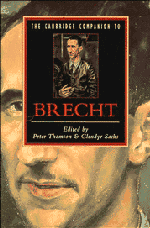Book contents
- Frontmatter
- PART 1 CONTEXT AND LIFE
- PART 2 THE PLAYS
- PART 3 THEORIES AND PRACTICES
- 13 Brecht and the Berliner Ensemble -- the making of a model
- 14 Key words in Brecht's theory and practice of theatre
- 15 Brecht's poetry
- 16 Brecht and music: theory and practice
- 17 Brecht and stage design: the Bühnenbildner and the Bühnenbauer
- 18 Actors on Brecht
- 19 Brecht's legacy
- Bibliography
- Index of Works
- General Index
19 - Brecht's legacy
from PART 3 - THEORIES AND PRACTICES
Published online by Cambridge University Press: 28 May 2006
- Frontmatter
- PART 1 CONTEXT AND LIFE
- PART 2 THE PLAYS
- PART 3 THEORIES AND PRACTICES
- 13 Brecht and the Berliner Ensemble -- the making of a model
- 14 Key words in Brecht's theory and practice of theatre
- 15 Brecht's poetry
- 16 Brecht and music: theory and practice
- 17 Brecht and stage design: the Bühnenbildner and the Bühnenbauer
- 18 Actors on Brecht
- 19 Brecht's legacy
- Bibliography
- Index of Works
- General Index
Summary
For playwrights or theatre practitioners to have their names turned into adjectives is a somewhat dubious accolade that is rarely accorded: in the last hundred years we have acquired Chekhovian, Shavian, Stanislavskian, Artaudian, even Beckettian and Pinteresque, but not Reinhardtian, Piscatorian, Brookian or Genetesque. But the one adjective that lifts most easily off the tongue, the one that sounds least like an Armenian exile, is undoubtedly 'Brechtian'. Alone among Germans (except for the somewhat arcane 'Schillerian'), Brecht enjoys, both as writer and director, a privilege which can be misleading and misappropriated: 'Brechtian' can legitimise; it can also limit; it can certainly distort.
Writing in the 'Sacred Cows' series, published in The Sunday Times Magazine in 1977, Sheridan Morley complained:
'Brechtian' has become one of those critical hold-alls, now bursting at the seams but still used to describe everything from a stage on which the designer has failed to place enough chairs to an acting company loosely dedicated to a political ideal somewhere faintly to the left of Mrs Thatcher.
- Type
- Chapter
- Information
- The Cambridge Companion to Brecht , pp. 273 - 287Publisher: Cambridge University PressPrint publication year: 1994
- 4
- Cited by



